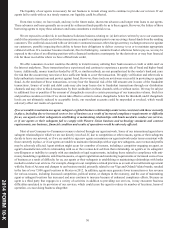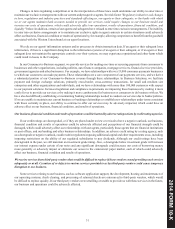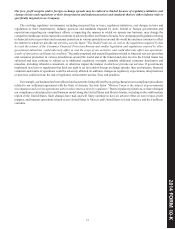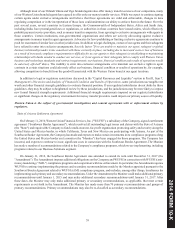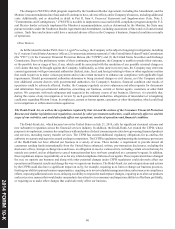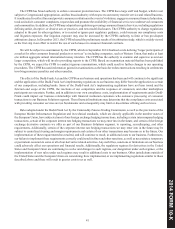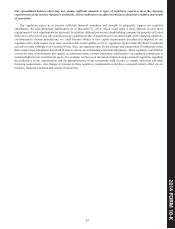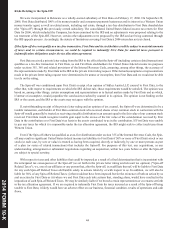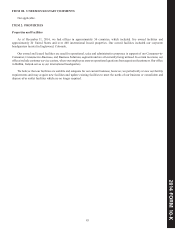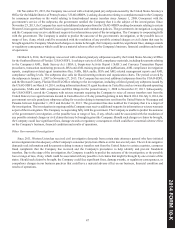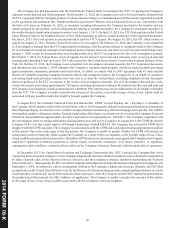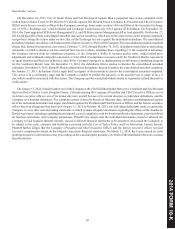Western Union 2014 Annual Report Download - page 178
Download and view the complete annual report
Please find page 178 of the 2014 Western Union annual report below. You can navigate through the pages in the report by either clicking on the pages listed below, or by using the keyword search tool below to find specific information within the annual report.
2014 FORM 10-K
40
The changes in WUFSI’s AML program required by the Southwest Border Agreement, including the Amendment, and the
Monitor’s recommendations have had, and will continue to have, adverse effects on the Company’s business, including additional
costs. Additionally, and as described in detail in Part II, Item 8, Financial Statements and Supplementary Data, Note 5,
"Commitments and Contingencies," if WUFSI is not able to implement a successful AML compliance program along the U.S.
and Mexico border or timely implement the Monitor’s recommendations, each as determined by the Monitor, the State may
pursue remedies under the Southwest Border Agreement and Amendment, including assessment of fines and civil and criminal
actions. Such fines and actions could have a material adverse effect on the Company’s business, financial condition or results
of operations.
Other Matters
As further described under Part I, Item 3, Legal Proceedings, the Company is the subject of ongoing investigations, including
by (1) various United States Attorneys' offices; (2) various state attorneys general; (3) the United States Federal Trade Commission
(the "FTC"); (4) the Consumer Financial Protection Bureau (the "CFPB"); and (5) the United States Securities and Exchange
Commission. Due to the preliminary nature of these continuing investigations, the Company is unable to predict their outcome,
or the possible loss or range of loss, if any, which could be associated with the resolution of any possible criminal charges or
civil claims that may be brought against the Company. Additionally, as it has done in recent years, the Company may enter into
consent agreements with governmental authorities (federal, state, local, and foreign) relating to these or other regulatory matters
that could require us to make various payments and to take certain measures to enhance our compliance with applicable legal
requirements. Should governmental authorities determine to bring criminal charges or civil claims, or if the Company enters
into additional consent decrees with governmental authorities, the Company's business, financial condition and results of
operations could be adversely affected. Further, the Company regularly receives subpoenas and other requests for documents
and information from governmental authorities concerning our business, current or former agents, customers or other third
parties. We cooperate with such subpoenas and requests in the ordinary course of our business. However, it is possible that,
during the course of any investigation or review by such governmental authorities, allegations of misconduct or wrongdoing
could arise regarding Western Union, its employees, current or former agents, customers or other third parties, which could lead
to investigations or enforcement actions against us.
The Dodd-Frank Act, as well as the regulations required by that Act and the actions of the Consumer Financial Protection
Bureau and similar legislation and regulations enacted by other government authorities, could adversely affect us and the
scope of our activities, and could adversely affect our operations, results of operations and financial condition.
The Dodd-Frank Act, which became law in the United States on July 21, 2010, calls for significant structural reforms and
new substantive regulation across the financial services industry. In addition, the Dodd-Frank Act created the CFPB, whose
purpose is to implement, examine for compliance with and enforce federal consumer protection laws governing financial products
and services, including money transfer services. The CFPB has created additional regulatory obligations for us and has the
authority to examine and supervise us and our larger competitors. The CFPB's regulations implementing the remittance provisions
of the Dodd-Frank Act have affected our business in a variety of areas. These include: a requirement to provide almost all
consumers sending funds internationally from the United States enhanced, written, pre-transaction disclosures, including the
disclosure of fees, foreign exchange rates and taxes, an obligation to resolve various errors, including certain errors that may be
outside our control, and an obligation to cancel transactions that have not been completed at a consumer's request. In addition,
these regulations impose responsibility on us for any related compliance failures of our agents. These requirements have changed
the way we operate our business and along with other potential changes under CFPB regulations could adversely affect our
operations and financial results and change the way we operate our business. The Dodd-Frank Act and interpretations and actions
by the CFPB could also have a significant impact on us by, for example, requiring us to limit or change our business practices,
limiting our ability to pursue business opportunities, requiring us to invest valuable management time and resources in compliance
efforts, imposing additional costs on us, delaying our ability to respond to marketplace changes, requiring us to alter our products
and services in a manner that would make our products less attractive to consumers and impair our ability to offer them profitably,
or requiring us to make other changes that could adversely affect our business.


